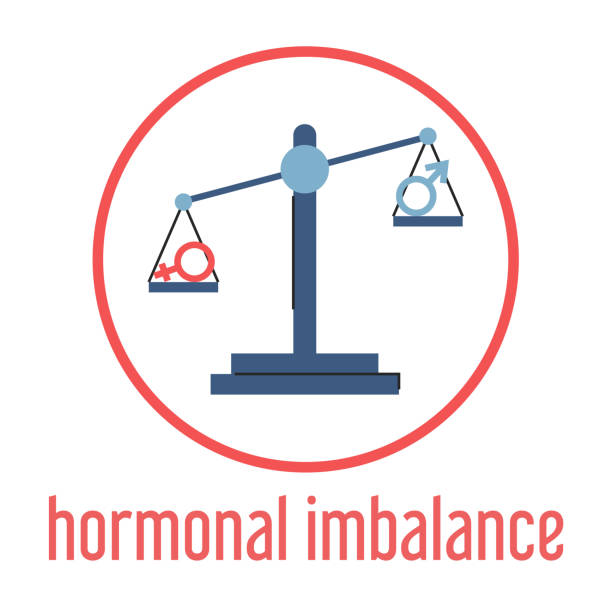
Have you ever noticed sudden changes in your mood, energy levels, or even your skin and hair? These changes may seem random, but they could be signs of something deeper—hormonal imbalance. Often overlooked, hormonal imbalance symptoms can be subtle or dramatic, affecting both men and women at different stages of life. When hormones are not in sync, they can wreak havoc on your physical and emotional health, causing a range of uncomfortable and disruptive symptoms. But what are the common hormonal imbalance symptoms, and how can they be treated?
Hormones are the body’s chemical messengers, controlling everything from your metabolism to your mood and even your reproductive system. So when there’s an imbalance, the effects can be far-reaching. Understanding hormonal imbalance symptoms is crucial in identifying when something isn’t quite right with your body. The symptoms can vary widely, depending on the specific hormone involved and whether you are male or female.
For women, hormonal imbalance symptoms are often tied to periods, menopause, or pregnancy. Fluctuations in estrogen and progesterone can lead to issues like irregular periods, hot flashes, weight gain, and mood swings. These changes are most commonly seen during perimenopause and menopause, but hormonal imbalances can occur at any stage in life. If you notice sudden weight gain, insomnia, or emotional swings, it might be time to investigate your hormones as the root cause of these changes.
Hormonal imbalance symptoms can also manifest as fatigue, even when you’re getting enough rest. Your thyroid plays a key role in regulating energy, so when it’s underactive (hypothyroidism), you may experience feelings of exhaustion, sluggishness, and a lack of motivation. On the other hand, an overactive thyroid (hyperthyroidism) can cause symptoms like anxiety, heart palpitations, and weight loss. If you’re experiencing these signs of hormonal imbalance, it’s essential to look deeper into thyroid function to find the cause.
But hormonal imbalance symptoms aren’t exclusive to women. Hormonal imbalance symptoms in men can also be debilitating, especially as men age. Testosterone levels naturally decline as men get older, leading to hormonal imbalance symptoms in men such as reduced libido, erectile dysfunction, weight gain, and fatigue. Low testosterone levels can also result in mood swings, irritability, and a lack of motivation. The symptoms may not be as widely discussed as they are in women, but they can significantly impact quality of life. If you notice any of these changes, it may be time to address the hormonal imbalance.
The causes of hormonal imbalance are numerous. Stress, poor diet, lack of exercise, and aging can all contribute to a hormonal imbalance, as can more serious conditions like polycystic ovary syndrome (PCOS) in women or low testosterone in men. Environmental toxins, medications, and even genetics can also play a role in disrupting hormonal health. But whatever the reason, the most important thing is to recognize the symptoms and seek proper treatment.
Hormonal Imbalance Treatment
When it comes to treating hormonal imbalances, a thorough diagnosis is the first step. Comprehensive tests, including blood work and specialized hormonal tests, can help identify which hormones are out of balance. Once the underlying cause is identified, a treatment plan can be put in place to restore balance. In some cases, hormone replacement therapy (HRT) or medications may be necessary, while at other times, lifestyle changes such as stress management, diet adjustments, and exercise can be just as effective.
Many facilities in India provide hormonal replacement therapy, one such is the anti-aging centre that offers specialized treatment programs which also include hormonal tests and hormonal replacement therapy that focus on identifying the hormonal imbalance symptoms and addressing them at their source. TAC’s longevity program includes advanced screenings and hormonal tests to pinpoint exactly where the imbalance is occurring in the body. From there, a customized treatment plan is developed, taking into account your unique health history and needs.
You might be wondering how this therapy works, especially if you’re hesitant about the tests and treatments. Here’s a quick example to clarify. If you’re experiencing hormonal imbalance symptoms in men, assessing your testosterone levels is crucial. Solutions like testosterone replacement therapy or lifestyle changes can naturally help boost hormone production. Similarly, women going through menopause or perimenopause can benefit from personalized treatments to manage symptoms like hot flashes, mood swings, and more.
Beyond just treatment, it’s essential to consider how hormones affect your entire body. Addressing hormonal imbalance symptoms involves stress management techniques, nutritional support, and physical therapy to restore balance. This integrated approach not only helps alleviate hormonal imbalance symptoms but also promotes overall well-being, ensuring that you feel your best inside and out.
Conclusion
Hormonal imbalance symptoms can be wide-ranging, affecting both men and women in different ways. Whether it’s hormonal imbalance symptoms in men like low testosterone or women experiencing the upheaval of menopause, recognizing the signs and seeking treatment is key. With TAC’s longevity program, advanced screenings, and hormonal testing, you can address the root causes of your imbalance and restore harmony to your body and mind. Don’t let hormonal imbalance symptoms control your life—take charge and find balance again with expert care.
